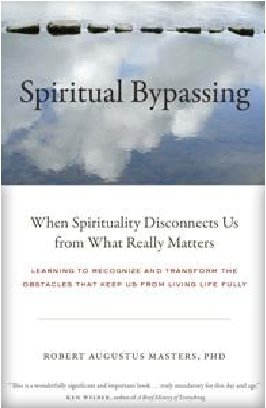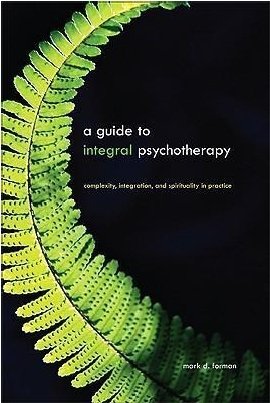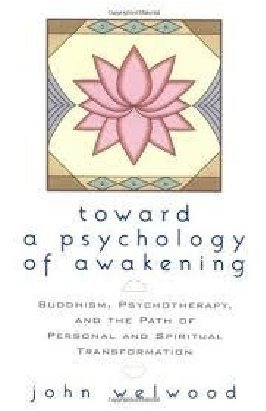HOW DO YOU KNOW IF YOU'RE SPIRITUALLY BYPASSING? – 7 MOST TOXIC SPIRITUAL HABITS

Spirituality should be a liberating experience, but sadly this is not true for all. Some of us use spirituality to hide and deny personal problems and unresolved wounds.
The term spiritual bypassing was coined by the psychologist John Welwood in the early 1980s. This concept refers to the use of spirituality as a smoke screen to avoid dealing with unresolved wounds, uncomfortable feelings, and human emotional and psychological needs.
"A widespread tendency to use spiritual ideas and practices to sidestep or avoid facing unresolved emotional issues, psychological wounds, and unfinished developmental tasks."
— John Welwood
An early attempt to approach this subject was done by the Chögyam Trungpa in his wonderful book "Cutting Through Spiritual Materialism".
What Are the Consequences of Spiritual Bypassing?
"We can use spiritual transcendence to rise above the raw and messy side of our humanness before we have fully faced and made peace with it. And then we tend to use absolute truth to disparage or dismiss relative human needs, feelings, psychological problems, relational difficulties, and developmental deficits."
— John WelwoodTrying to move beyond our psychological and emotional issues by sidestepping them is dangerous. It sets up a debilitating split between the Buddha and the human within us. And it leads to a conceptual, one-sided kind of spirituality where one pole of life is elevated at the expense of its opposite: Absolute truth is favored over relative truth, the impersonal over the personal, emptiness over form, transcendence over embodiment, and detachment over feeling.
— John Welwood
Everyday Examples of Spiritual Bypassing
- Avoiding Conflict
- Compassion as a Disguise
- Pleasing the "Guru"
- Suppressing Feelings
- Spiritual Perfectionist
- Spiritual Mask
- Spiritual Narcissism

1 – Avoiding Conflict
Have you ever met the easy going nice guy or gal? They are easy to spot. When mistreated or insulted, they don't acknowledge the other person as being hurtful or even abusive towards them.
They have a hard time accepting their own personal experience of being frustrated, disrespected or hurt. Most of the time they ignore that experience by making excuses for the bad behavior of others.
In general they resort to being tolerant and patient in order to bypass their hurt and disguised anger. This creates a distortion in communication with others, by not mirroring reality accurately, and soon or later, that will surface in a different dysfunctional form.
This behavior leads to anger suppression, and in the long run, opens the door to psychosomatic disturbances or illnesses. Avoiding conflict has a price tag to be paid in terms of diminished awareness and health.

2 – Compassion as a Disguise
You can identify this outer behavior as being very caring and helpful towards others, but underneath what drives it has its roots in guilt, shame, fear and obligation. This kind of compassion is a smoke screen enacted for a secondary gain. The gain is to feel good about one self, because underneath one thinks s/he is defective or bad.
So, by giving a friendly ear, listening attentively to what others are saying and focusing on them, one secretly hopes that the other in turn will focus on them. This secret wish is not mentioned or ever overtly expressed. This strategy of focusing exclusively on others leads to the denial of ones needs, whether they be physical, emotional, psychological or spiritual. You ask them what they want, and they send the same question back at you. They even might ask you to start the conversation or pick the theme that pleases you. This is passive communication.
If "compassion as a disguise" is questioned, they will answer by hiding behind abstract concepts of compassion and selflessness, in order to dismiss their human emotions, relegating them to a secondary role, or even negate them, especially the so called negative ones, like anger or sadness.
Relationships for them are always difficult as they assume the role of sidekick, leaving the limelight to their partner. It is a kind of 20-80% relationship. In pure psychologist lingo this is called co-dependency.

3 – Pleasing the "Guru"
You know them, you have seen this before, always trying to sit closer to the "guru", repeating "ad nauseam" her quotes, and elevating the "guru" to a superior status of heavenly spiritual qualities.
This behavior of adulation and flattery towards the "guru" has a purpose, it feeds the unconscious emotional need of being validated, feeling special, loved, and important. It also denotes an irrational idealization of the "guru", and her capacities.
Under the rug, there is another unconscious conflict dealing with competitive feelings towards other members of the tribe, group, or sangha. The origin of this behavior goes back to childhood. Being in such a context (tribe, group, or sangha), one begins to unconsciously reenact childhood dynamics, like acting-out aggressively and/or seeking to gain love.
There is also a narrative to justifying all this adulation. The narrative is that the guru has something special and unique to give you (which you don't already have), and as such you need to be seen as worthy to receive it.

4 – Suppressing Feelings
Have you been with "poker faced" spiritual people, and felt cold in their presence? Well, that is the result of suppressing feelings and threading the path of "detachment".
Many fall for this mistake of conceiving "detachment" as the suppression of human connection, desire, and the healthy need for love. This wrong idea about the meaning and importance of "detachment", make them actively avoid intimacy, love, and relationships in general.
By doing this they avoid having to suffer with disappointments, and failed relationships, but the price they pay is becoming hollow, emotionally detached, aloof, un-empathic, and self-centered.
Believing that desire is the root cause of all attachment, they become uninterested in life, and wash away all desire, or passion.
There is a tendency to suppress needs, any needs, because being seen as "needy" is, for them, a sign of low spiritual development, or being a source of bad/negative vibes.

5 – Spiritual Perfectionist
This is a major one. The tyranny of perfectionism fuels unquestioned blindness or strict adherence to protocols, dogma, or doctrines. We see this in the frequent use of sentences like "I don't do that", and also "I should do this".
Perfectionism sets the absolute standard to be reached, the highest goal for one's aspiration. In reality, what perfectionism creates is a state of unhappiness, and dissatisfaction, as idealized standards will never be reached.
It is common to see the use of renunciation as a justification for emotional anorexia and self-denial. Along these lines, pain and harsh discipline is encouraged, to the extend of rejecting the needs of the body. This is a veiled form of masochism disguised as spiritual assertiveness.
It is a paradox that often happens in yoga when people start not to listen to the body, but being extremely hard on oneself, always pushing forward, and denying reality, awareness of the moment and love of the body/self, to favor some mental image or imaginary construct.

6 – Spiritual Mask
This trick works by over compensating a perceived lack of identity. This leads towards promoting a so called spiritual identity over the normal everyday identity.
The person will try to excel in being perfect to compensate for feelings of inadequacy in ordinary life.
The same goes for the use of spiritual practices to divert or suppress undesirable feelings of inadequacy, or being unloved. By doing this one creates the artificial mask of a spiritual persona.

7 – Spiritual Narcissism
The spiritual path can offer amazing insights and experiences, but with some people, this can lead to an ego inflation, a sense of self importance, or the notion that one is better than others. In short "I know best the solution to your problems", which denotes some arrogance to say the least.
When "spiritual narcissism" strikes people tend to pity others, or undervalue them for being materialistic, or make statements like:
- "…people like you got trapped in lies"
- "…you have need to spread this negativity"
- "…I thought better of you"
- "…you are not a spiritual evolved being"
Opposed to the grandiose or inflated spiritual narcissism we have the spiritual closeted narcissism. This last one is pre-occupied or self-absorbed about her own inadequacies and failures.
This is also common in depression where one uses spiritual teachings like selflessness to feel even more inadequate and ashamed, trapped in layers of suffering and self-punishment
We all came across scandals involving spiritual leaders or "gurus" that caused widespread suffering in their tribes, communities or sangha. All this due to their self-inflation, self-importance, and denial of real human needs. Not to mention the con artists.

Using the Truth to Deny (7 habits plus 1)
How can one use the truth to deny? One can use the trick of manipulate absolute truth in order to deny a relative truth. Let's see some examples:
- "If there is no self I shouldn't pay attention to my feelings nor should I have any needs or wants."
- "My feelings are empty, so I just have to observe them and let them go" (the problem here is if the feelings have relevant information to tell us, then we dismissing a great opportunity to know more about oneself and further discover our nature)
- "Emptiness means nothing conventional is important."
- "Desire is the problem, so just don't have any desires."
Last Thoughts
To end, spirituality doesn't solve psychological problems, and psychology is not able by itself to further the spiritual path. Each challenge, either spiritual or psychological, has to be confronted in appropriate manner, and with the right set of skills. Try to become aware of what they are and how you approach them.
A lot more about this pressing subject didn't fit on this post. So, I guess I will have to come back to the topic: exploring a bit further and suggest solutions.
Bibliography
Some books that might prepare the way ahead:



Enjoyed the article? Let us help share the words, please comment, resteem with your friends.
Thank you for stopping by, I hope you enjoyed my work please subscribe / become a Patron (link below).
SUPPORT
Donate bitcoin:
1Muiz2Q733u9nYWDdFbFwtj9m6gBmLeGxK


Very nice post! I think we all grow by listening to our feelings. They are there to be felt.
Thank you @arsenal49. Indeed, emotions bring with them valuable information about our internal and external environment, without them we lose a valuable piece of our puzzle, and the motivation to act on it (e-motion).
I had more to say about this, but I am saving it for another post. Take care.
I would love to see some post where you go in-depth in each one. We often forget all these "20 ways to become happier". People, including myself, need to make small changes, and therefore we need to take in a little bit of information and then make a change before we read about the next step without having done the first.
As I said I will comeback to the topic. In the meanwhile you can give a peek to my website. You might find what you are looking for (or not) http://awakedevelopment.com
Great post! Thanks for sharing.
Subscribed
Thank you @irainman Appreciated.
This article Is a deception, why I can accept that strict adherence to religion can be closed minded, as the believer just blindly believes. We all should be open enough to seek true knowledge. I study what life Is actually about and I'm still seeking ultimate truth, I wish to know. This article Is not only attacking spirituality It's attempting to convince people your just a human and nothing else, Wake up there are many trying to deceive us and they're very clever. I 100% know this Is false, we are spiritual beings and awareness, we are Pure Consciousness.
Awesome post, thank you for sharing! So great to see how we can come out the other side of the Rabbit hole! I have some interesting material you may be interested in.
Great post @awakedev, been there done that ;)